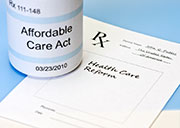- Could Artificial Sweeteners Be Aging the Brain Faster?
- Techniques for Soothing Your Nervous System
- Does the Water in Your House Smell Funny? Here’s Why
- Can a Daily Dose of Apple Cider Vinegar Actually Aid Weight Loss?
- 6 Health Beverages That Can Actually Spike Your Blood Sugar
- Treatment Options for Social Anxiety Disorder
- Understanding the Connection Between Anxiety and Depression
- How Daily Prunes Can Influence Cholesterol and Inflammation
- When to Take B12 for Better Absorption and Energy
- Epsom Salts: Health Benefits and Uses
Millions of Americans Reaping Benefits of Affordable Care Act: Study


Millions more Americans have affordable health insurance, access to a personal doctor and feel they are in better shape following the first two open-enrollment periods of the Affordable Care Act, a new analysis shows.
The survey, which involved more than half a million U.S. adults, found that the Affordable Care Act (ACA), often called Obamacare, has reversed what had been a downward spiral in which health care was becoming more costly and less available to many Americans, said lead researcher Dr. Benjamin Sommers. Sommers is a health economist with Harvard’s T.H. Chan School of Public Health and a primary care physician with Brigham and Women’s Hospital in Boston.
In particular, minority groups and the chronically ill have made huge strides in gaining health coverage and getting the care they need, the researchers reported.
Close to 16 million more adults have gained health coverage, a reduction of almost 8 percent in those who were previously uninsured, Sommers said.
“Since the passage of the Affordable Care Act five years ago, we’ve seen the largest reduction in the uninsured rate in four decades,” he said.
Sommers said other findings include:
- 7 million more adults have access to a personal physician, a 3.5 percent improvement.
- Almost 5 million more adults have easy access to medicines, an improvement of more than 2 percent.
- 11 million more adults say they can afford the health care their family needs, a 5.5 percent improvement.
In addition, almost 7 million more adults described themselves as being in excellent, very good or good health, rather than fair or poor health, Sommers said. Previous research has shown that people who say they are in fair or poor health have markedly higher death rates, he explained.
The results are published in the July 28 issue of the Journal of the American Medical Association.
“There are no surprises here, because there’s no question the ACA has enabled extraordinary progress with respect to improving coverage and access to health care,” said Ron Pollack, founding executive director of Families USA, a health care consumer advocacy group. “It’s pretty clear that one out of three people who were previously uninsured have gained health care coverage.”
Sommers chalked up the improvements to three main factors related to Obamacare: children aged 25 and under remaining on their parents’ health plans; the opening of the state-level health insurance marketplaces; and the expansion of Medicaid in 30 states.
“Among the millions of people who have gained coverage through the new marketplaces, almost nine out of 10 of those are receiving subsidies that make coverage affordable for the first time,” Pollack said.
Sommers added that people with chronic conditions — such as diabetes, cancer or heart disease — have experienced significant improvements in their self-reported health, and a reduction in health-related limitations to their daily activities.
“These results make sense, given that under the Affordable Care Act, insurance companies can no longer discriminate based on pre-existing medical conditions,” he said.
Low-income adults in Medicaid expansion states experienced a significant drop in the uninsured rates, and as a result more had gotten their own personal physician and were experiencing easier access to medicine, the study found.
Minority groups also appeared to benefit most under the Affordable Care Act, researchers found. For example, nearly twice as many Hispanics (nearly 12 percent) and blacks (almost 11 percent) reported that they were no longer uninsured, compared with just 6 percent of whites.
These numbers “suggest that the ACA may be associated with reductions in longstanding disparities in access to care,” Sommers said.
In the study, Sommers and his colleagues analyzed results of the 2012-2015 Gallup-Healthways Well-Being Index, a daily national telephone survey. The researchers examined changes in coverage and health care access for U.S. adults aged 18 to 64 since the first open-enrollment period began in October 2013, compared with trends prior to the implementation of the Affordable Care Act.
The researchers tried to control for the impact that the economy might have had on people’s improving fortunes by including data such as whether a person was working, their household income and their state’s annual unemployment rate, Sommers said.
“That gives us pretty good confidence that major changes in the economy aren’t driving these results,” he said.
More information
For more about the Affordable Care Act, visit the U.S. Department of Health and Human Services.
Source: HealthDay
Copyright © 2026 HealthDay. All rights reserved.










